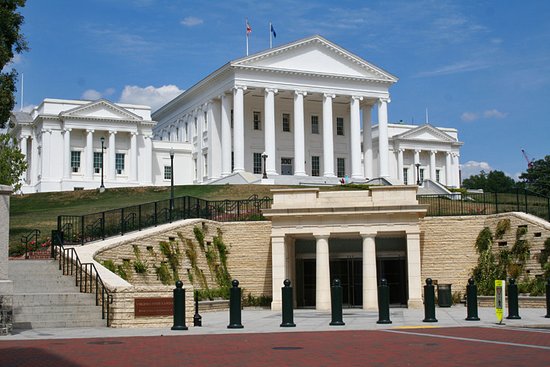General Assembly preview
 Legislative proposals for the 2018 General Assembly session have been trickling in since late last year, though that trickle will soon become a deluge in advance of legislature's Jan. 10 start date. Legislative proposals for the 2018 General Assembly session have been trickling in since late last year, though that trickle will soon become a deluge in advance of legislature's Jan. 10 start date.
Among the proposals already on file are two competing bills both dealing with access to student directory information. HB 1 would prohibit access to any and all student contact data unless a student has opted-in to such disclosure, while HB 147 would preserve current law -- which provides for discretionary release and an opt-out system -- and would instead specifically exempt access to student cell phone numbers and personal email addresses.
HB 4 would require the Office of Executive Secretary to make the case management database more publicly accessible, while HB 5 would remove the blackout on information about the drugs used in Virginia's lethal injection procedures, or the pharmacies that provide those drugs, that was implemented in 2016.
Follow these and other access-related bills on VCOG's annual legislative chart.
New legislative intern
VCOG is happy to introduce our fourth Chip Woodrum Legislative Intern: Macoia Richmond. Macoia (it rhymes with muh-FOIA; how's that for perfect?) is a senior criminal justice major at VCU. She'll be joining us in January and February to learn about open government and the legislative process in Virginia.
New newsletter
Our daily newsletter of FOIA, access and transparency news got a face lift last month. If you haven't subscribed yet to this free offering, sign up here.
FOIA & records management
VCOG's next FOIA and records management webinar will be held Wednesday, Jan. 24. The webinar, presented by Megan Rhyne of VCOG and Glenn Smith of the Library of Virginia, is free and open to anyone, though the records management portion is specifically aimed at government employees.
Register here
SCOVA to hear FOIA case
The Supreme Court of Virginia has agreed to hear a case out of Rappahannock County, Bragg v. BOS of Rappahannock County. In addition to issues surrounding proper motions to go into closed session, the case will take up what makes an adequate affidavit of good cause that a FOIA plaintiff must file in circuit court. In this case, the affidavit included an acknowledgement by a board of supervisors member that matters not covered by an exemption were discussed in closed session, but the trial court said the acknowledgement didn't amount to "good cause." Read all of the points of error that will be considered on the Supreme Court of Virginia's website. And read about the background of the case here.
Norfolk court says deadline violations are "minor"
In a case brought against the City of Norfolk alleging violations of FOIA's response times and fee estimates, a Norfolk Circuit Court gives deference to prior FOIA Council opinions and finds:
-
the city waived its objection to the plaintiff's failure to file an affidavit of good cause by not bringing it up within 7 days of the plaintiff filing his petition;
-
FOIA's 5-day response time is not put on hold while the city asks the requester for clarification of what he's asking fort;
-
the plaintiff's FOIA request met the reasonable specificity requirement for all requests;
-
the 5-day response time clock begins the day after a FOIA request is received;
-
if a requester hasn't forwarded a deposit, a public body isn't obligated to forward responsive records;
-
a public body cannot cure its failure to respond within the 5-day response time by arguing its eventual response was within the 12 working days it would have gotten if it had asked for 7 working days within the 5 original working days;
-
declaratory relief is not an available remedy under FOIA; and
-
response-time failures are minor technical violations that "do not rise to a level warranting an award of costs."
Read the full opinion in Hurst v. City of Norfolk on VCOG's website.
Open government in the news
The Virginia Economic Development Partnership declined to release the proposal Virginia submitted to Amazon as part of the retailer's request for proposals to build its second headquarters. Many states and localities around the country have similarly refused requests to disclose proposals. The Detroit Free Press got hold of the proposal that city and the neighboring Canadian region submitted, which revealed significant tax breaks and incentives that would extend for decades.
Richmond officials refused to disclose which local and national developers had signed up to receive updates on potential calls for proposals to replace the Richmond Coliseum, saying revealing the names would "adversely affect" Richmond's ability to negotiate with the businesses.
The Portsmouth Redevelopment and Housing Authority refused to release a letter of intent the authority signed with an Ohio-based developer to build 59 rent-controlled apartments on a lot city council members have said they want to put a grocery store. The authority chose to withhold the letter under the exemption for the negotiation of contracts.
The Richmond School Board was criticized when it voted to approve a five-year $224.8 million facilities plan without making the plan available to the public and without taking public comment. By contrast, when a facilities plan was considered during the 2014-15 school year, the board held 18 public meetings.
The Hampton School Board renamed an alternative learning center, stripping it of its Robert E. Lee moniker, without a public vote. In a news release, the board said the facility is not a school and so renaming it was an administrative function not subject to board governance.
The Senate Office of Compliance refused Sen. Tim Kaine's request for data on taxpayer funded settlements of sexual harassment claims in that chamber. The office cited 1995 "confidentiality provisions" to explain why the office did not have "reliable information regarding the number of sexual harassment claims that have been filed or settled, the identities or positions of the individuals alleged to have committed sexual harassment, or why the parties reached settlements."
The Front Royal Town Council went into closed session to hear the results of a compensation study conducted by an outside firm. Initially, the board cited the personnel exemption and the exemption for the investment of public funds as justification for why the presentation could be held behind closed doors. Later, it cited the exemption for discussion of documents prepared exclusively for use in closed session instead. The town's attorney said the study could contain recommendations to eliminate certain positions that, if made public, might cause chaos or prompt resignations. The town manager said the report would be released when it was "complete and correct."
The Virginia Beach Economic Development Department bought 26 new iPads and a laptop to replace older ones, but they were not distributed for six months because of irregularities in the procurement process, emails obtained by The Virginian-Pilot through FOIA revealed.
The chair of the Prince William County School Board filed two $1.35 million defamation lawsuits against citizens who allegedly made false statements in public to attack the chair's character. One man's comments were made in a Facebook post, while another man's comments were made during "citizen's time" at a school board meeting.
America Rising, a Virginia-based Republican campaign research group submitted several federal FOIA requests for emails written by EPA employees who had made publicly critical comments about either administrator Scott Pruitt or President Donald Trump. The EPA has since hired a company affiliated with America Rising to provide "media monitoring" services it says is needed to keep better track of newspaper and video stories about the EPA.
A Loudoun County Sheriff's Office deputy was charged with two felony counts of using a computer to gather identifying information from the Virginia Criminal Information Network and 30 related misdemeanor counts related to unauthorized access of VCIN data between May 2014 and November 2016.
The Suffolk Circuit Court recently began digitizing its land records that go back to 1866. A company has been hired to take care of the project, which is estimated to cost between $216,000 and $226,000. Most of the funds are coming from court fees charged to folks filing civil actions and land records. |



 Legislative proposals for the 2018 General Assembly session have been trickling in since late last year, though that trickle will soon become a deluge in advance of legislature's Jan. 10 start date.
Legislative proposals for the 2018 General Assembly session have been trickling in since late last year, though that trickle will soon become a deluge in advance of legislature's Jan. 10 start date.